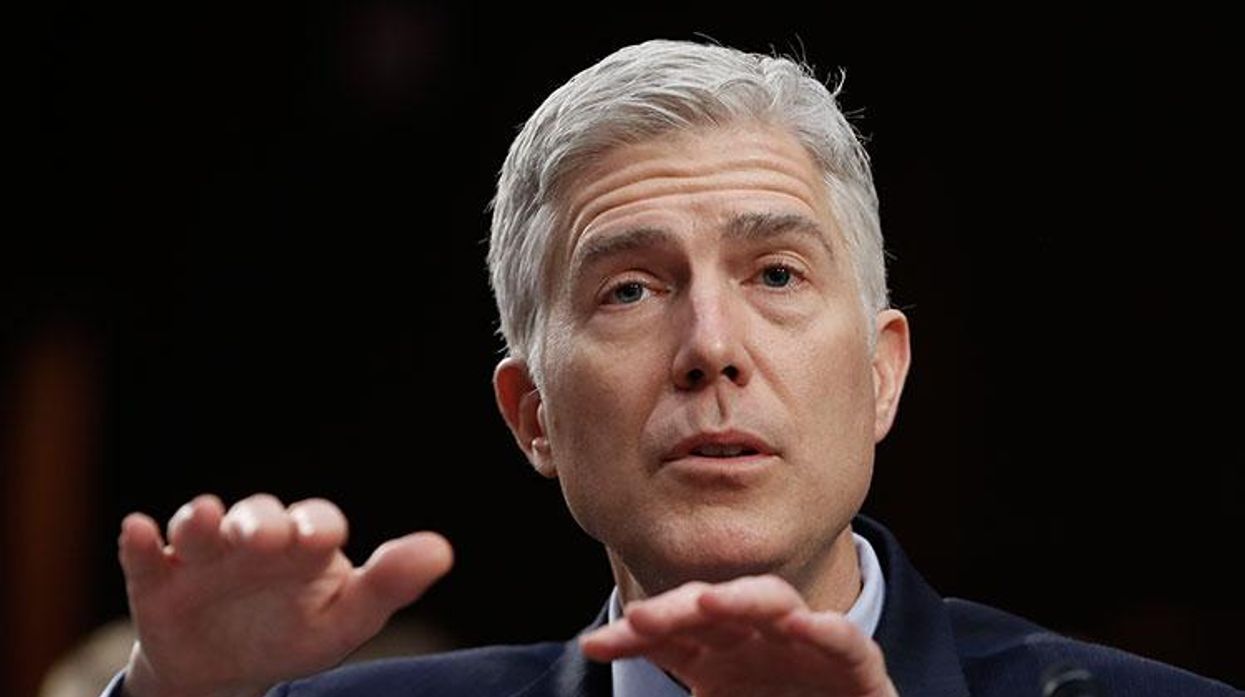Voices
Gorsuch: Skeptical That LGBT People Deserve Rights

Trump's Supreme Court nominee is a threat to our equality, writes Julianna Gonen of the National Center for Lesbian Rights.
April 05 2017 1:23 AM EST
By continuing to use our site, you agree to our Privacy Policy and Terms of Use.

Trump's Supreme Court nominee is a threat to our equality, writes Julianna Gonen of the National Center for Lesbian Rights.
This week the Senate will vote on the nomination of Judge Neil Gorsuch to the U.S. Supreme Court against a multilayered backdrop of opposition. Opposition that, for many LGBTQ rights advocates, only increased after Gorsuch's confirmation hearings. During these hearings, Gorsuch referred to Obergefell v. Hodges, the 2015 U.S. Supreme Court case that recognized marriage equality, as "settled law."
This acknowledgement should have come as a relief to many, particularly as the team of people with whom I work at the National Center for Lesbian Rights helped bring this case to the Supreme Court. However, it is cold comfort because after a slew of carefully worded answers, Gorsuch refused to affirm the legal reasoning underlying the court's interpretation of constitutional protections for the LGBTQ community. Gorsuch has also endorsed the view that religious beliefs can justify discrimination, even when others are harmed. A vote to confirm Gorsuch would jeopardize the LGBTQ community's hard-won achievement of basic freedom and constitutional rights.
Gorsuch is deeply skeptical of the fundamental constitutional rights recognized by the Supreme Court that ensure fair and equal treatment for LGBTQ people. The fact that the cases striking down antisodomy laws (Lawrence v. Texas) and recognizing marriage equality (Obergefell v. Hodges) have already been decided should not make us complacent. Right now there is a concerted effort by anti-LGBTQ organizations and elected officials to nullify Obergefell by contending that while it may require states to issue marriage licenses to same-sex couples, it does not require equal treatment of married same-sex couples. The Arkansas Supreme Court recently issued a decision based on that very argument, holding that Obergefell does not require equal treatment of married same-sex couples with respect to the issuance of birth certificates for their children. And a few weeks ago the Texas Supreme Court heard oral arguments in a case in which state officials are arguing that Obergefell does not require equal employment benefits for same-sex spouses.
These are real, not hypothetical, concerns, and we have every reason to be gravely concerned that Judge Gorsuch would permit Obergefell and other decisions involving fundamental rights to be effectively nullified were he to be confirmed.
Gorsuch also espouses a breathtakingly broad view of religious liberty, one that allows virtually anyone who expresses a religious objection to opt out of laws with which they disagree. His ruling in the Hobby Lobby case (involving employee access to contraceptive coverage) before it reached the Supreme Court gave no consideration to the employees' health care needs and instead endorsed a view of "complicity" that is sweeping and alarming. Under his reasoning, a religious objection to doing something that might even very indirectly facilitate conduct that violates the objector's faith is enough to allow for an opt-out.
Religious refusals have long been a significant problem in the realm of reproductive health care, and we now see such refusals surfacing around nondiscrimination laws and the right to marry, which are core concerns for the LGBTQ community. Private businesses are fighting in court for the right to deny services to same-sex couples, states are introducing laws to allow sweeping religious opt-outs from nondiscrimination laws, and employers are citing Hobby Lobby to justify firing transgender employees. Elevating Gorsuch to the Supreme Court would be a serious setback to the equality of LGBTQ people for which we have all fought so hard.
What Justice Kennedy wrote so eloquently in Obergefell contrasts sharply with Judge Gorsuch's exceedingly narrow views regarding our most cherished rights: "The nature of injustice is that we may not always see it in our own times. The generations that wrote and ratified the Bill of Rights and the Fourteenth Amendment did not presume to know the extent of freedom in all of its dimensions, and so they entrusted to future generations a charter protecting the right of all persons to enjoy liberty as we learn its meaning. When new insight reveals discord between the Constitution's central protections and a received legal stricture, a claim to liberty must be addressed." We fear that with Judge Gorsuch on the bench, this continual exercise of securing freedom for all by applying the Constitution's "central protections" will be halted and many, including LGBTQ people, would be left out in the cold.
JULIANNA S. GONEN, Esq., is policy director at the National Center for Lesbian Rights, which has 40 years of experience in advancing LGBTQ equality through litigation, legislation, policy, and public education.
Charlie Kirk DID say stoning gay people was the 'perfect law' — and these other heinous quotes